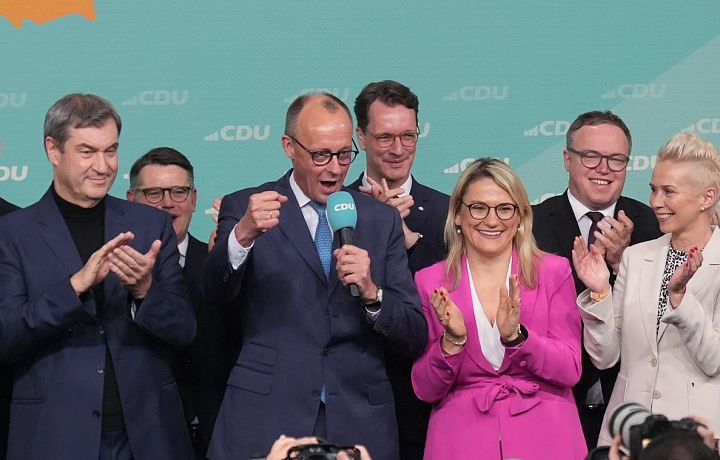The winner of the German elections is Friedrich Merz. He criticized Americans and announced the unification of Europe.
In the early Sunday elections, the CDU/CSU, led by Friedrich Merz, emerged victorious and, as expected, the party leader is almost certain to become the new German Chancellor. Although the result in this regard is definitely not surprising, the elections were extraordinary in other respects. A record voter turnout was recorded, reflecting the intense interest of German citizens in politics, and the far-right AfD achieved the best result in its history.
Votes in Germany were still being counted for many long hours after the polling stations closed at 6:00 p.m., but preliminary exit polls by the German television stations ZDF and ARD were enough to announce the crucial news before 7:00 p.m., with Friedrich Merz making a speech in which he declared himself the winner of the elections.
According to the polls in Germany, there was no other alternative with the first on the strip. It raised many more questions as to what the final electoral math would be in terms of forming a coalition government. A result of around 30% definitely did not allow the Christian Democrats to consider a single-color majority government. But Merz's party did not reach this line and had to settle for a gain of 28.5% of the votes.
AfD does not want to join the government, it will unite Europe
During the celebratory speeches, Merz, despite the uncertainty, once again ruled out cooperation with the AfD, which would have allowed him to achieve a comfortable majority in the Bundestag. He had no choice but to turn to a grand coalition with the Social Democrats.
It was long awaited to see the performance of smaller parties around 5 %, as their results in the electoral arithmetic could mean the possibility of getting by with a large coalition of two parties, which have different ideological backgrounds, but there is a greater chance of agreement on key politics.
The broader traffic light coalition of social democrats, greens, and liberals led to the fall of Olaf Scholz's government and the recent early elections. The complexity of intra-coalition agreement also significantly limited Germany's ability to implement desired reforms. However, Merz caught attention with his sharp expression towards foreign policy.
"I have absolutely no illusions about what is happening in America. Look at Elon Musk's recent interventions in the German election campaign. Interventions from Washington were no less dramatic and ultimately even outrageous than interventions into elections that we used to see from Moscow. So we are under massive pressure from both sides. My absolute priority now is really to create unity in Europe,"
Friedrich Merz announced this even before the official vote count, according to the AP agency. Therefore, the European Union, including the Czech Republic, can expect strong pressure from the most powerful member state to unify Europe, which could also mean changes in the acceptance of European decisions.
Record turnout and the failure of the Social Democrats
An essential message of the German elections is also the high voter turnout when 83% of German citizens did not hesitate to go to the polls on election Sunday. Politics is a significant topic for Germans, and perhaps this is where we can seek the cause of the extraordinary success of the far-right AfD, which is designated by the authorities as a security risk for the state. Particularly due to scandals regarding the receipt of money from Russia by party members.
Although the results are not yet official, according to the census data, the grand coalition of CDU/CSU and socialists will have a slim majority in the Bundestag. If Merz wants to secure a constitutional majority, he will need the support of the Greens.
While the traditional left, represented by the SPD, suffered a debacle in the form of the worst result in recent decades (16.4%), the radical left Die Linke improved and achieved 8.8 %. Other parties around five percent did not cross the threshold according to available data.
Sources: author's text, DW, AP, irozhlas.cz











